- Home
- Dante Alighieri
Love That Moves the Sun and Other Stars Page 2
Love That Moves the Sun and Other Stars Read online
Page 2
with His sacred blood, His cries raised high)
should go to her Belovèd in delight,
sure of herself and truer still to Him,
and so ordained two princes that, on either side,
should walk along with her and be her guide.
The one was seraph-like in burning love,
the other in intelligence a splendour
on the earth that shone like Heaven’s cherubim.
I’ll speak of one. For – take whichever man –
in prizing him, you’ll praise the other, too.
Their different actions served a single plan.
Between the Tupin and the stream that runs
down from the hill that saintly Ubald chose,
a fertile slope hangs off that mountainside
from which Perugia, through its Sun Gate, feels
both heat and chill. Behind that ridge, weeping,
are Nòcera and Gualdo, bowed by wind and shade.
And where its swiftest incline crashes down,
another sun was born to light the world –
as our sun ranges, sometimes, from the Ganges.
Let those, inventing words to suit that place,
not voice “Assisi” as “Ascesi” or “Arisen”
(these words all want) but properly the “Orient”.
Nor was he far from his own rising dawn
when he began to make his country feel,
by his true powers, a certain strengthening.
Headlong he ran – a callow boy – to war
and fought, against his father, for a girl
to whom – as though to death – all lock joy’s door.
So, coram patre in the bishop’s court,
he joined himself with her and, ever on,
from day to day he loved her all the more.
She, sad and widowed of her first beloved,
remained a thousand years (and more) till he
came on to her – obscure, undated, scorned.
Nor did it count to hear how Caesar – terror
of the world – had found her true, unwavering,
with Amyclas, not moved by his command.
Nor did it count to hear that, likewise, she,
so fierce, so constant, wept (Mary herself
remained below) with Christ upon his Cross.
But lest in what I say I prove unclear,
then understand, in all I’ve just poured out,
this loving pair are Francis and pure Poverty.
The harmony, the looks of happiness
between these two, their tenderness and care,
their love, so wonderstruck, became the cause
of holy thoughts in Bernard (now revered),
the first who flung his shoes away and raced –
running, he thought himself too slow – for peace.
Such rampant goodness, riches yet untold!
Egidio flung his shoes away, Sylvester his,
chasing the groom, the bride so pleased them all.
So off he goes, Saint Francis, father, lord.
His bride was Poverty, his family these –
their waists already bound with simple cord.
Nor in abjection did it weigh his brows
to be Pietro Bernadone’s kid,
nor when, amazingly, he faced disdain.
Rather, in sovereign manner he revealed
his stern intention to Pope Innocent,
who granted this devotion its first seal.
And when his little pauper-company
had grown (the wonder of his life would sound
far more when sung in glory in the skies),
this archimandrite in his holy will
was crowned now with a second diadem,
breathed by Eternal Spirit through Honorius.
Then after, thirsting for a martyr’s fate,
he preached (before the Sultan’s prideful throne)
his faith in Christ and all who followed him,
but found these people loath and far too sour
to change their ways. So, not to wait in vain,
he soon returned, to tend Italian vines.
A rough crag splits the Arno’s course from Tiber.
There Francis took from Christ the final seal,
and on his limbs for two years bore that sign.
And when the one who’d dealt him so much good
was pleased to draw him up to that reward
which Francis earned through his great lowliness,
he then bestowed his donna, held so dear,
on followers and brothers, his true heirs,
commanding them, in faith, to love her well.
And from her bosom this illustrious soul
then chose to part, returning to his realm,
and chose no other bier for his own corpse.
Think of the other now, what he was like
if fit to work with Francis and maintain
the Ship of Peter on its rightful track.
Such was our patriarch, Saint Dominic.
And those who follow him as he commands
will bear, as you can tell, a precious freight.
But now this pastor’s flock turns ravenous
for weird new fodder, so they cannot fail
to scatter wide through many different leas.
The further – wilful, wandering and wild –
his sheep desert him, so the emptier
they are of milk, returning to the fold.
It’s true that some are fearful of such harm,
huddling against their shepherd still. They’re few.
There’s not much cloth now needed for their cowls.
Now if my words in meaning aren’t too faint,
if you have been attentive, hearing them,
if you call what’s been said to mind once more,
in part what you desire will be content.
You’ll see why that firm plant is torn to shreds,
and see the strict correction that contends:
“Where all grow fat that do not go astray.” ’
Canto XIV
Centre to circle or circle to centre:
water in a round container moves like that,
depending where the rim is struck, inside or out.
I utter here the instant thought that chanced
across my mind when now, in all its glory,
the life of Thomas Aquinas fell silent,
born from a close resemblance that arose
between his words and these that, after him,
were voiced by Beatrice. She began:
‘This man still needs – although he does not say,
nor is he even thinking it as yet –
to trace another truth down to its root.
Tell him: that light in which, as what you are,
your being in its substance is in-flowered,
will that remain eternally with you?
And if it does remain, then tell him how,
when once you are remade as visibles,
it cannot spoil your eyesight, being so.’
Compare: as dancers – wheeling, drawn and pressed
by keener happiness at certain points –
exult in voice, their gestures quickening,
so now, to hear her prompt, devoted prayer,
the holy circles showed new joy, in turns
of flashing speed and notes to wonder at.
Whoever mourns to think we here must die,
to live our lives up there, has never seen
the cool refreshment of the eternal shower.
The one and two and three who always lives
and always reign in three and two and one,
uncircumscribed and circumscribing all,
had, three times now, been lauded in the songs
of every spirit there, the melody
a condign prize, however great the worth.
Then, in the holiest of lights amo
ng
the lesser ring, I heard a voice (as modest
as, maybe, the angel’s to Maria),
answering: ‘As long as this great festival
of Paradise goes on, so, too, our love
will cast these robes in rays around us all.
That brightness follows from their inward fire,
that fire from vision. And their sight extends
as far as each, beyond their due, has grace.
But when the glorious and sacred flesh
is clothing us once more, our person then
will be – complete and whole – more pleasing still.
For then whatever has been granted us,
by utmost good, of free and gracious light
(the light through which we see Him) will increase.
Hence, as must be, our seeing will increase,
increasing, too, the fire that vision lights,
the ray increasing that proceeds from that.
But just as burning coal may give out flames,
yet overcome these with its own white light,
keeping, within, its shape and semblance whole,
so, too, the shining-out that rings us round
will, in appearance, be surpassed by flesh
which all day long the earth now covers up.
Nor can it be that so much light will tire.
Our organs, physically, will have the strength
for every pleasure that can come to us.’
So ready and alert they seemed to me –
those double choirs – to add their plain ‘Amen’
they showed their keen desire for long dead bones,
not only for themselves but for their mums,
their fathers, too, and others dear to them,
before they were these sempiternal flames.
Look! Round those circles, matched in clarity,
a lustre, more than what was there, was born,
as though a new horizon, brightening.
When early evening hours are drawing in,
new things begin to show across the sky
so that the sight both seems and seems not true.
There, too, it seemed to me that newer things
began to rise to view and form a ring
beyond the circumscription of those two.
True spark shower flying from the Holy Breath!
How suddenly it flared, how incandescent!
My eyes, defeated, could not bear the sight.
But Beatrice showed herself to me –
laughing, so beautiful she must be left
among things seen that memory can’t pursue.
And so my eyes, regaining their right strength,
lifted once more. I saw myself alone,
borne with my lady to a higher good.
Seeing the flares of laughter in that star,
which seemed now far more fiery than before,
I knew full well that I’d been lifted higher.
With all my heart and with that tongue – flaming
alike in all our thoughts – aflame, I made to God
burnt offerings that befitted this new grace.
Nor had the ardour of that sacrifice
been drained still from my heart before it was,
I knew, propitious and acceptable.
For shining so – a ruby in its hue –
splendour appeared to me in two crossed rays.
‘Eliosun!’ I said. ‘You grant this accolade.’
The galaxy, distinctly marked by lights,
both great and small, between the earth’s two poles,
glistens and makes the learnèd wonder why.
So too, like constellations in the depths
of Mars, these rays composed the honoured sign
that quadrants (joined within a circle) form.
And here remembering surpasses skill:
that cross, in sudden flaring, blazed out Christ
so I can find no fit comparison.
But those who take their cross and follow Christ
will let me off where, wearily, I fail,
seeing in that white dawn, as lightning, Christ.
From horn to horn, from summit down to base,
there moved here scintillating points of light,
bright as their paths met, bright in passing on.
So minute specks of matter can be seen –
renewing how they look at every glance,
straight in their track, oblique, long, short, swift, slow –
moving through sunbeams that will sometimes streak
the shade that people, to protect themselves,
have won through their intelligence or art.
As harp or viol – in tempered harmony,
their many strings stretched tight – still ring and sing,
even to those who do not catch the tune,
so, though I did not understand their hymn,
an air now gathered that enraptured me
from lights appearing there throughout the cross.
I realized full well it sang high praise
for, as to one who does not understand
yet hears, there came to me, ‘Rise up!’ and ‘Win!’
At which, I sank so deep in love of this
that never till that time had anything
entrammelled me in such delightful bonds.
These words of mine may seem perhaps too bold,
slighting the pleasure of those lovely eyes,
in which, when gazing, my desires all rest.
Whoever thinks, though, that the living prints
of every beauty grow the more they rise,
and notices I did not turn to these,
will make excuse for what I here confess
to win excuse, and see me speak the truth.
Holy delight is not excluded here.
Rather, in rising it will grow more pure.
Canto XVII
As Phaeton once, approaching Clymene,
to know for sure that news about himself
which still makes fathers chary of their sons,
so was I, too – and so was understood
by Beatrice and that holy lamp
which had, because of me, first left its place.
At which my lady said: ‘Send out the flare
of your desire, as clear in coming forth
as, inwardly, the fire is stamped in you,
not to increase, by saying what that is,
the knowledge we already have, but more,
to find, when speaking out, we slake your thirst.’
‘You, the dear soil in which I thrive. You so
on-high yourself that you see well (as sure
as mortals know, in triangles, two angles
aren’t obtuse) contingencies before
they come to be, your eye set wondering on
the point at which all times are present time.
While I was still in Virgil’s company,
climbing the hill that remedies our souls,
so, too, descending to the dead, waste world,
he spoke to me in grave and weighty words
about my future life, so I should feel
four-square against the blows that were to come.
I’d therefore willingly receive sure words
that told what fortune now draws near to me.
Those arrows that we know will come fly slower.’
I said all this to that same light that, first,
had spoken out to me, and thus confessed,
as Beatrice wished, what I desired.
Not in those enigmatic words that once
entrammelled pagan fools, like birds in lime,
before the Lamb of God bore off their sin,
but clear, precise and solemn in his speech,
that father-love now gave me his reply,
enclosed, yet shown, in his own laughing light.
‘Contingency, whose sphere does not e
xtend
beyond the margins of your earthly things,
is framed and painted in eternal sight.
This does not, though, imply necessity,
except, as might be when some glass reflects
a ship swept onward by a raging stream.
From that same view there comes before my eyes
(as to the ear sweet melodies may come)
the time that now prepares itself for you.
As once Hippolytus was driven out
of Athens by his father’s wife, perverse
and pitiless, so you’ll leave Florence, too.
This much is willed, this much already sought.
And soon he’ll see it through, who thinks it up,
where all day long Christ’s self is bought and sold.
Shrill cries of blame will chase the ones who lose –
they always do. But vengeance, when it falls,
will speak of that same Truth that deals it out.
You’ll leave behind you all you hold most dear.
And this will be the grievous arrow barb
that exile, first of all, will shoot your way.
And you will taste the saltiness of bread
when offered by another’s hand – as, too,
how hard it is to climb a stranger’s stair.
Yet what will weigh upon your shoulders worst
is all the foul, ill-minded company
that you, in that dark vale, will fall to keep.
For that ungrateful, crazy, vicious crew
will turn as one against you. Yet it’s them
whose brows before too long will blush with shame.
Their deeds will prove what animals they are.
And so much so, the finer course for you
would be to form a party on your own.
Your refuge and your safe abode will be
the courtesy at first of that great Lombard
whose blazon is a stair and holy bird.
And he will hold you in such high regard
that “ask” and “do” between the two of you
will place as first what others put behind.
You’ll see, along with him, his brother, too,
so strongly marked, when he was born, by Mars
that all his deeds will prove remarkable.
People as yet know nothing of this man.
He is still fresh and young. The astral wheels
have worked around him for a mere nine years.
Before the Gascon tricks great Henry, though,
the sparks of his high virtue will appear,
scornful of silver and the toils of war.
His proud liberality will make its mark,
and even enemies, in seeing that,
will have no power to mute their tongues in praise.
Await him, and the good he’ll bring to you.
By him a multitude will be transformed,

 Circles of Hell
Circles of Hell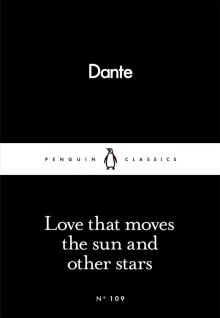 Love That Moves the Sun and Other Stars
Love That Moves the Sun and Other Stars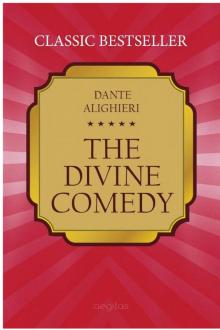 The Divine Comedy
The Divine Comedy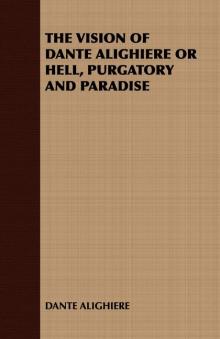 The Vision of Dante Alighiere or Hell, Purgatory and Paradise
The Vision of Dante Alighiere or Hell, Purgatory and Paradise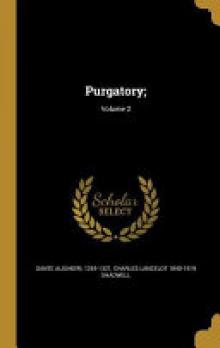 Purgatory
Purgatory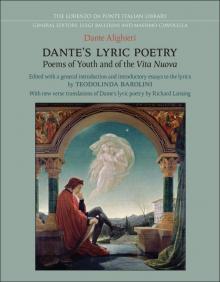 Dante's Lyric Poems (Italian Poetry in Translation)
Dante's Lyric Poems (Italian Poetry in Translation)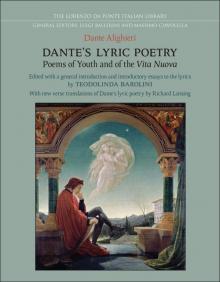 Dante's Lyric Poetry: Poems of Youth and of the 'Vita Nuova'
Dante's Lyric Poetry: Poems of Youth and of the 'Vita Nuova'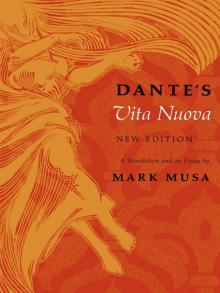 Dante’s Vita Nuova, New Edition: A Translation and an Essay
Dante’s Vita Nuova, New Edition: A Translation and an Essay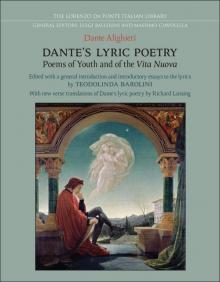 Dante's Lyric Poetry
Dante's Lyric Poetry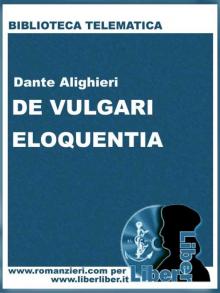 De vulgari eloquentia
De vulgari eloquentia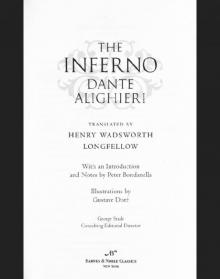 The Inferno (Barnes & Noble Classics Series)
The Inferno (Barnes & Noble Classics Series)